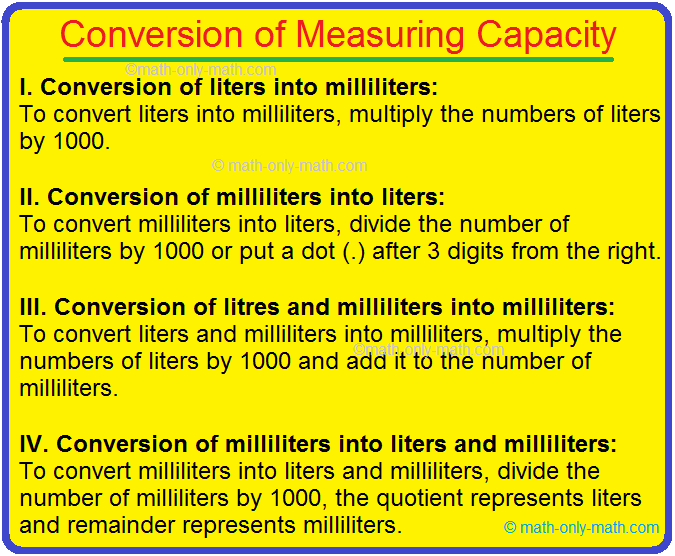Subscribe to our ▶️ YouTube channel 🔴 for the latest videos, updates, and tips.
Conversion of Measuring Capacity
In conversion of measuring capacity we will learn how to convert liters into milliliters, milliliters into liters, liters and milliliters into milliliters and milliliters into liters and milliliters.
Conversion of units of capacity is same as conversion of mass.
1ℓ = 1000 mℓ
I. Conversion of liters into milliliters:
To convert liters into milliliters, multiply the numbers of liters by 1000.
In other words,
To convert litre into millilitre, we write three zeroes (000) to the right of the number of litres.
As, 1 litre = 1000 millilitres, 5 litres = 5000 millilitres
Consider some of the examples:
1. Convert the following liters into millilitres
(i) 1 liter = 1 × 1000 ml = 1000 ml
(ii) 2 liters = 2 × 1000 ml = 2000 ml
(iii) 5 liters = 5 × 1000 ml = 5000 ml
(iv) 7 liters = 7 × 1000 ml = 7000 ml
(v) 9 liters = 9 × 1000 ml = 9000 ml
(vi) 12 liters = 12 × 1000 ml = 12000 ml
2. Convert 9 l into ml.
Solution:
1 litre = 1000 millilitres
9 litre = 9 × 1000 millilitres
= 9000 ml
3. Convert 2 l 650 ml into ml.
Solution:
1 litre = 1000 millilitres
2 litre = 2 × 1000 millilitres
= 2000 ml
2 l 650 ml = 2000 + 650
= 2650 ml
4. Convert 4 l 475 ml into ml.
Solution:
1 litre = 1000 millilitres
4 litre = 4 × 1000 millilitres
= 4000 ml
4 l 475 ml = 4000 + 475
= 4475 ml
II. Conversion of milliliters into liters:
To convert milliliters into liters, divide the number of milliliters by 1000 or put a dot (.) after 3 digits from the right.
In other words,
To convert millilitres into litres, we take the first 3 digits of the number from the extreme right as millilitres and the rest are written as litres.
Consider some of the examples:
1. Convert the following millilitres into liters.
(i) 1000 ml = 1000 ÷ 1000 liter = 1 liter
(ii) 2000 ml = 2000 ÷ 1000 liters = 2 liters
(iii) 5000 ml = 5000 ÷ 1000 liters = 5 liters
(iv) 9000 ml = 9000 ÷ 1000 liters = 9 liters
(v) 10000 ml = 10000 ÷ 1000 liters = 10 liters
(vi) 15000 ml = 15000 ÷ 1000 liters = 15 liters
2. Convert 6340 ml into litres and millilitres.
Solution:
6340 ml = 6000 ml + 340 ml
6000 ml = 6 l
6340 ml = 6 l 340 ml
A shortcut method to convert millilitre into litre is to write three digits from right as millilitre and the remaining as litre.
For example we write 6340 ml as 6 l 340 ml.
III. Conversion of litres and milliliters into milliliters:
To convert liters and milliliters into milliliters, multiply the numbers of liters by 1000 and add it to the number of milliliters.
Consider some of the examples:
(i) 1 l 200 ml = 1 × 1000 ml + 200 ml = 1000 ml + 200 ml = 1200 ml
(ii) 2 l 700 ml = 2 × 1000 ml + 700 ml = 2000 ml + 700 ml = 2700 ml
(iii) 5 l 400 ml = 5 × 1000 ml + 400 ml = 5000 ml + 400 ml = 5400 ml
(iv) 9 l 900 ml = 9 × 1000 ml + 900 ml = 9000 ml + 900 ml = 9900 ml
(v) 11 l 046 ml = 11 × 1000 ml + 046 ml = 11000 ml + 046 ml = 11046 ml
(vi) 15 l 1 ml = 15 × 1000 ml + 1 ml = 15000 ml + 1 ml = 15001 ml
IV. Conversion of milliliters into liters and milliliters:
To convert milliliters into liters and milliliters, divide the number of milliliters by 1000, the quotient represents liters and remainder represents milliliters.
Consider some of the examples:
(i) 2400 ml = 2400 ÷ 1000 l = 2 l 400 ml
(ii) 5640 ml = 5640 ÷ 1000 l = 5 l 640 ml
(iii) 8007 ml = 8007 ÷ 1000 l = 8 l 7 ml
(iv) 9856 ml = 9856 ÷ 1000 l = 9 l 856 ml
(v) 10456 ml = 10456 ÷ 1000 l = 10 l 456 ml
(vi) 15002 ml = 15002 ÷ 1000 l = 15 l 2 ml
(vii) 25025 ml = 25025 ÷ 1000 l = 25 l 25 ml
(viii) 31012 ml = 31012 ÷ 1000 l = 31 l 12 ml
Questions and Answers on Conversion of Measuring Capacity:
I. Convert litres into millilitres:
(i) 2 l
(ii) 1 l 140 ml
(iii) 5 l
(iv) 5 l 5 ml
(v) 9 l 345 ml
(vi) 8 l 25 ml
Answer:
I. (i) 2000 ml
(ii) 1140 ml
(iii) 5000 ml
(iv) 5005 ml
(v) 9345 ml
(vi) 8025 ml
II. Convert millilitres into litres and millilitres:
(i) 7000 ml
(ii) 5732 ml
(iii) 9000 ml
(iv) 7870 ml
(v) 8004 ml
(vi) 1936 ml
Answer:
II. (i) 7 l
(ii) 5 l 732 ml
(iii) 9 l
(iv) 7 l 870 ml
(v) 8 l 4 ml
(vi) 1 l 936 ml
Conversion of Standard Unit of Capacity
Addition and Subtraction of Measuring Capacity
From Conversion of Measuring Capacity to HOME PAGE
Didn't find what you were looking for? Or want to know more information about Math Only Math. Use this Google Search to find what you need.



New! Comments
Have your say about what you just read! Leave me a comment in the box below. Ask a Question or Answer a Question.